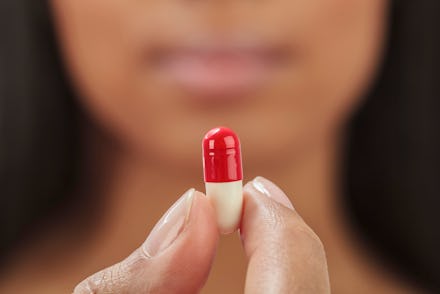"Female Viagra" Has Finally Arrived — Here's Why It's Actually Important for Women

On Tuesday, the Food and Drug Administration (finally) approved the marketing of flibanserin. The drug, which maker Sprout Pharmaceuticals says will be available starting Oct. 17, is intended to help boost libido for women with hypoactive sexual desire disorder, or low sex drive.
But everyone just wants to call the drug "female Viagra."
Unlike its male counterpart, however, flibanserin works on a woman's brain chemistry to reignite libido — and as a result, the drug has also sparked debate over whether the medical community should endorse a standard for "normal" female sexual desire.
In a culture that so often condemns or straight-up ignores female sexuality, it's valid to wonder whether we should be telling any woman it's wrong not to want to have sex. But women who experience HSDD and have had the chance to try the drug say it's a godsend, not only for their sex lives, but also for their relationships and self-esteem.
Women want to want to have sex: In interviews with Mic, a number of the women who experience HSDD and who participated in flibanserin's clinical trials say they faced relationship and identity struggles stemming from low sexual desire. For some, those issues are what led them to seek medical intervention in the first place.
"When things are not going well in the bedroom, it tends to spill over to the breakfast table," Cindy Whitehead, CEO of Sprout Pharmaceuticals, the company that has been developing flibanserin, told Mic. "We so often make sex the punch line of the joke, but you cannot minimize the life impact that HSDD has for these women. People say nobody is going to lose their life over low sexual desire, but they may lose their life as they know it."
For women who hope to salvage their partnerships, reestablishing a mutual sexual relationship can be crucial. Amanda Parrish, who participated in a flibanserin clinical trial four years ago, told Mic she would have sex with her partner even in the face of a complete lack of desire, if only to maintain a physical connection she considers fundamental.
"It comes to the point where my husband can tell that I'm obliging, and that's really sad for me," Parrish said. "It changes the whole dynamic of our relationship and our intimacy. As someone who loves to be with him, that's what I want to get back: that want to want."
Parrish said physical intimacy can only go so far without the presence of sexual desire or arousal. "I know that the physical act of having sex makes me feel closer to my husband," she said. "But there's also a huge difference when that desire is there."
Making desire a choice: Although some medical professionals argue flibanserin's possible side effects, which include dizziness, nausea and fatigue, make it too dangerous for widespread use, others argue it should be up to individual women to decide. Is it worth the discomfort to boost libido?
For Cara*, who took flibanserin during an 18-month clinical trial several years ago, the answer has always been a resounding yes.
"When you feel what I felt — like I wasn't me —you want to do something to get back to the best you you can be," Cara said. "Flibanserin did that for me, and I would take it tomorrow, today, this afternoon if it gets approved. It's so important to be who you think you are, who you know you are, and this drug allows me to do that."
Luckily, FDA approval doesn't mean every woman who experiences HSDD has to take flibanserin, nor does it necessarily send the message that it's not cool to be cool with sexual apathy. Helping women to "fix" their issues with sexual desire doesn't have to be about trying to make them "normal." It's also about allowing women to feel content with their sex lives and maintain their relationships as they see fit.
Causes more problems than it solves? While Cara might not have experienced any negative side effects life-altering enough to forego the flibanserin trial, other women might feel differently about the risks. Doctors have warned the drug could cause low blood pressure and fainting, both of which increase the risk of more serious injury.
There have also been major concerns about the drug's efficacy. According to the results from one clinical trial, women had marginally better outcomes in terms of desired sexual encounters on flibanserin than they did with a placebo. A vocal contingent of critics within the medical community have also challenged the classification of HSDD as a real medical condition, and claim that popping a pill might not be the way to treat low sexual desire in women.
Starting a larger conversation about desire: Despite the drug's relatively unimpressive performance in clinical trials, the truth is, a majority of the women who hope to use flibanserin just want to want to have sex. But so do many other women who don't have HSDD, but have low desire because of another medical condition or as a side effect of other medications they take, such as antidepressants.
While those women might not be able to use flibanserin, that doesn't mean the drug can't help them. It's already opened up a conversation about female sexual desire, and that helps everyone.
"Really, if you get down to it, sex is part of who we are and part of how we feel about ourselves, and certainly part of most of our relationships," Whitehead said. "We need to have a fact-based conversation about sexuality. This drug just sends a spark into a much larger conversation that needs to happen."
*Names have been changed to allow subjects to speak freely on private matters.